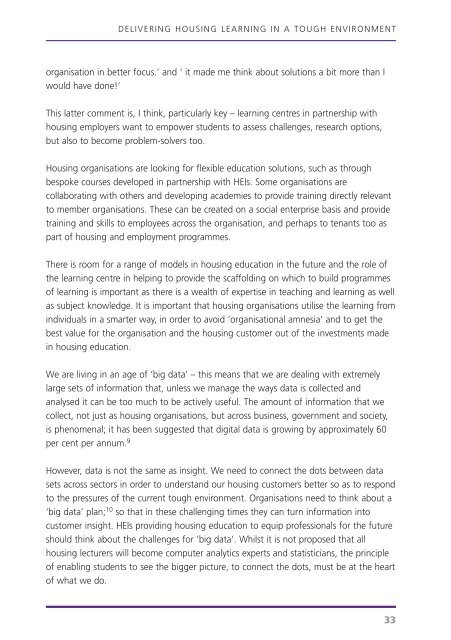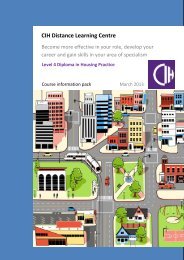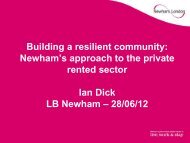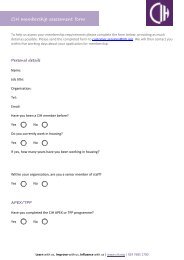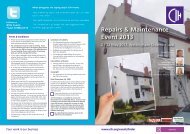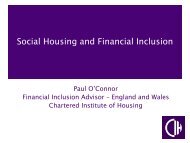View publication - Chartered Institute of Housing
View publication - Chartered Institute of Housing
View publication - Chartered Institute of Housing
You also want an ePaper? Increase the reach of your titles
YUMPU automatically turns print PDFs into web optimized ePapers that Google loves.
DELIVERING HOUSING LEARNING IN A TOUGH ENVIRONMENT<br />
organisation in better focus.’ and ‘ it made me think about solutions a bit more than I<br />
would have done!’<br />
This latter comment is, I think, particularly key – learning centres in partnership with<br />
housing employers want to empower students to assess challenges, research options,<br />
but also to become problem-solvers too.<br />
<strong>Housing</strong> organisations are looking for flexible education solutions, such as through<br />
bespoke courses developed in partnership with HEIs. Some organisations are<br />
collaborating with others and developing academies to provide training directly relevant<br />
to member organisations. These can be created on a social enterprise basis and provide<br />
training and skills to employees across the organisation, and perhaps to tenants too as<br />
part <strong>of</strong> housing and employment programmes.<br />
There is room for a range <strong>of</strong> models in housing education in the future and the role <strong>of</strong><br />
the learning centre in helping to provide the scaffolding on which to build programmes<br />
<strong>of</strong> learning is important as there is a wealth <strong>of</strong> expertise in teaching and learning as well<br />
as subject knowledge. It is important that housing organisations utilise the learning from<br />
individuals in a smarter way, in order to avoid ‘organisational amnesia’ and to get the<br />
best value for the organisation and the housing customer out <strong>of</strong> the investments made<br />
in housing education.<br />
We are living in an age <strong>of</strong> ‘big data’ – this means that we are dealing with extremely<br />
large sets <strong>of</strong> information that, unless we manage the ways data is collected and<br />
analysed it can be too much to be actively useful. The amount <strong>of</strong> information that we<br />
collect, not just as housing organisations, but across business, government and society,<br />
is phenomenal; it has been suggested that digital data is growing by approximately 60<br />
per cent per annum. 9<br />
However, data is not the same as insight. We need to connect the dots between data<br />
sets across sectors in order to understand our housing customers better so as to respond<br />
to the pressures <strong>of</strong> the current tough environment. Organisations need to think about a<br />
‘big data’ plan; 10 so that in these challenging times they can turn information into<br />
customer insight. HEIs providing housing education to equip pr<strong>of</strong>essionals for the future<br />
should think about the challenges for ‘big data’. Whilst it is not proposed that all<br />
housing lecturers will become computer analytics experts and statisticians, the principle<br />
<strong>of</strong> enabling students to see the bigger picture, to connect the dots, must be at the heart<br />
<strong>of</strong> what we do.<br />
33


